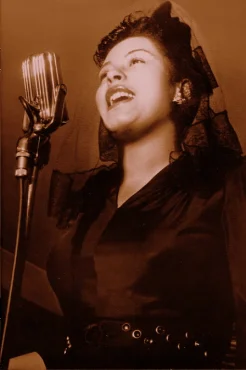Lazybones – lyric
_______________________
- See also our Lazybones feature page, which includes selected recordings of the song.
LAZYBONES lyric* by Johnny Mercer, from The Complete Lyrics of Johnny Mercer, by Johnny Mercer, Robert Kimball, Barry Day, Miles Kreuger (pub. 2009), p. 23
verse:
Long as there is chicken gravy on your rice,
Ev’rything is nice.
Long as there’s watermelon on the vine,
Ev’rything is fine.
You got no time to work,
You got no time to play,
Busy doin’ nothin’ all the live long day.
You won’t ever change no matter what I say,
You’re just made that way.
refrain:
Lazybones, sleepin’ in the sun,
How you ‘spec’ to get your day’s work done?
Never get your day’s work done
Sleepin’ in the noonday sun.
Lazybones, sleepin’ in the shade,
How you ‘spec’ to get your corn meal made?
Never get your corn meal made
Sleepin’ in the evenin’ shade.
When ‘taters need sprayin’,
I bet you keep prayin’
The bugs fall off of the vine
And when you go fishin’,
I bet you keep wishin’
The fish won’t grab at your line.
Lazybones, loafin’ thru the day,
How you ‘spec’ to make a dime that way?
Never make a dime that way —
Well, looky here,
He never heared a word I say!
The above lyric is very close to that sung by Mildred Bailey in her 1933 recording. At the end of the chorus she returns to the beginning of the third section and repeats secs. 3 and 4. She adds the phrase “You’re an old…” to the beginning of the fourth chorus section, second time around.
Among the distinctive features in Carmichael’s Soundie version of 1941 are the following:
- He omits the verse.1
- Additional words — “Now, tell me…,” “That..,” “You’re such a…” — are added to the beginning of some lines of the lyric.
- In the fourth refrain or chorus section, he sings “sleepin’ all the day” instead of “loafin’ thru the day.”
- There is a brief instrumental break after the fourth chorus section followed by a repeat of the fourth section only.
- Dancing is performed by Dorothy Dandridge and Peter Ray, the latter balancing a tea tray on his head as he dances.
American dialect phrasing, shortened and altered words, and idiom employed in the lyric:
- You got = You’ve got, or You have
- ‘spec’ = expect. Hence, the phrase “How you ‘spec’…?” means “How do you expect…?” The word “do” is implied, not spoken/sung.
- “Never get your day’s work done” — The word “You’ll” is implied but omitted from the beginning of this line and two other lines starting with the word “Never.”
- ‘taters = potatos. The phrase “‘taters need sprayin'” suggests a need for treating with pesticide potato plants infested with bugs.
- An apostrophe replacing a “g”at the end of a word ending with “-ing” indicates that the hard “g” sound is dropped. It isn’t vocalized at all.
- To “make a dime” is an idiom. “Make” means to earn or profit. The expression doesn’t mean to “profit ten cents.” It means to “profit a small amount.” The phrase may have been derived from “make a dime’s worth.”
- heared = heard. I’ve yet to come across a version in which the original dialectal word “heared” in the final line of the refrain is used rather than “heard.” According to Johnny Mercer, as quoted in Skylark: The Life and Times of Johnny Mercer, by Philip Furia (2004), p. 132, the line “He never heared a word I say” was written by Hoagy Carmichael.
Re: the other versions at our feature page:
- The Mills Brothers (early 1930s version) and Ted Lewis each employ a lot of artistic license with the song, adding words, substituting different words, and bending phrases, but the results sound natural and relaxed. Lewis omits the verse, and actually doesn’t sing the song at all. He speaks the lines, in a quasi-conversational manner.
[return to the Lazybones feature page]
___________________________________
* lyric: from the Wikipedia article on “lyrics”:
The word lyric came to be used for the “words of a song”; this meaning was recorded in 1876.[1] The common plural (perhaps because of the association between the plurals lyrics and words), predominates contemporary usage. Use of the singular form lyric to refer to a song’s complete set of words is grammatically acceptable. However, it is not considered acceptable to refer to a singular word in a song as a lyric.
_______________________________
1 The term “verse” in classic American popular song means the introductory material which precedes the chorus. Verses, which may be obligatory in the context of a musical score, are often omitted in popular renditions. In a show, the verse has transitional and summarizing functions. It allows the character to review the action or emotional flux which precedes and leads up to the song. The habit of writing verses for songs not intended for the stage was probably a carryover of the theatrical format. The transitional function is absent in popular songs, though the verse may retain the introductory purpose of setting the stage for what is to come. When not functioning as a transitional section, a verse may attempt to describe the emotional impact of some relationship or event(s) revealed in the chorus, or say essentially the same thing as the chorus in an alternate way.
The practice of writing verses was eventually dropped by songwriters as the average length of a popular song dwindled over time, eventually approaching two and half minutes in the 1940s and 1950s. By the 1960s the shortening trend had reversed.*
Another factor which may have led to the demise of the verse in pop songs was the general consensus of songwriters and publishers that if the verse of a new song was good enough it ought to be used in the chorus of another new song. So they generally considered a song’s verse to be inferior in quality to its chorus.
_______________
* A post titled Average Pop Song Length By Decade, at website The Lister, features a list of average pop song length by decade for the 1940s through 2010s, ranked from longest to shortest. The ranked list was derived from material originally published at the now defunct site “The Billboard Experiment” (described here).































Oct 13, 2012 @ 08:11:42
Thank you for providing the full lyrics – it’s very hard these days to find the full original lyrics to many standards, as many singers only sing the chorus or the intro verses, and the rest of many songs get lost in the shuffle…
LikeLiked by 1 person
Oct 13, 2012 @ 09:30:57
Eli,
You’re welcome. Thanks for stopping by. Good resources for complete lyrics, including verses and alternate versions are the “Complete Lyrics” collections of the works of Irving Berlin, Lorenz Hart, Ira Gershwin, Cole Porter, and Johnny Mercer. You’ll find links to the Google eBook previews of some of these under “Lyrics” or “books and authors” in my sidebar. Robert Kimball is either editor or co-editor of all of these.
LikeLike
Jan 25, 2014 @ 21:47:17
I was 12, when I first heard Lazy Bones and I loved the song and the words were ideal for the way it was performed in the “down south” way. I had written the words as I heard one sing Lazy Bones., naturally as I grew up I lost them. Later on as teenagers my buddies and I really enjoyed singing Lazy Bones and had a lot of fun. To this day I enjoy singing all the songs of the 40’s thru the 80’s. I have slowed down some because I will be 90 in June. Thank you very much for Johnny Mercers lyrics to Lazy Bones…Michael Todero, 01/25/14.
LikeLiked by 1 person
Jan 26, 2014 @ 10:28:58
Hi Michael,
You’re very welcome. Thanks for visiting and taking the time to share some of your personal experience regarding Lazybones.
LikeLike
Aug 12, 2015 @ 20:32:53
I’m 83 and i grew up listening to my mom recording and studying all kinds of music genres and memorizing all of them. Love your article
LikeLiked by 1 person
Aug 12, 2015 @ 21:00:44
Hi Janet,
Thanks for sharing the memory of your mother’s eclectic musical interests with us. And for the kind compliment.
Warm regards, doc
LikeLike